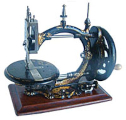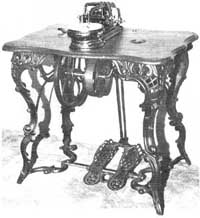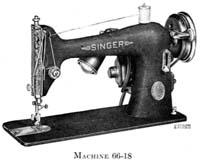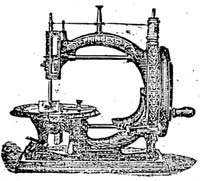Working for Singer,
part 4
Early days at Singer
....Continued from previous issue
A change took place in the Canterbury district in the year 1886, Mr. Wilkinson, the manager, being transferred to Edinburgh to take up the management for that district.
A few weeks after this, I received an offer from the company to take up the position as assistant to him, as I was told the district wanted re-organizing, and I was to take charge of the outside staff.
It was rather a critical question to decide, for I had this time a lady who had to be consulted, and before I got the question settled I received a wire from the late general manager, Mr. J Whittie, asking me to reply at once.
That settled it; the lady and I joined partnership and were in Edinburgh within three weeks. What a change to quiet, quaint, sleepy old Canterbury. Never shall I forget on arrival in "Modern Athens", on a dark winter's night.
The Caledonian Station at that time was very dilapidated, and not a very impressive place to arrive at. Princess Street was dark, grim and dismal. There was a heavy fall of snow. We had no friends to meet us, for we were strangers in a strange land, but sufficient for us was the fact that we had agreed to "face the music" together, and had confidence in each other's ability to come out on top. We soon got settled down, and spent 12 long years in "Auld Reekie".
I might mention my wife was "A Woman of Kent" and I can best describe myself as a mongrel, something between Welsh and Scotch, with a dash of English.
It took me some time to get accustomed to the people and their system of housing. How can I describe 'Modern Athens" 35 years ago? It is bad enough today, but at that time it was quite a luxury for a working man's house in the old town to be fitted with ordinary sanitary conveniences, and quite the usual thing for slops, garbage and filth to be emptied from the tenement windows into the closes, which was duly garnered by a man with an iron shovel and barrow in due season.
The ordinary working-man's house consisted, as it does now, of two rooms, but there were thousands of families who had only one room, which acted as kitchen, bedroom, dining room, dirt ridden, and God knows what, and this luxurious dwelling-place was shared in hundreds of cases by father, mother, and perhaps four or five sons and daughters.
The problem of how they shared this room was never solved by me. I only know they were like dogs in a kennel, the only difference being that the dogs would live under better sanitary conditions.
Many of these old stairs and tenements were dens of iniquity, and foulsome places to canvass. As I got the selling staffs organized and found time, I commenced to accompany the collector-salesmen on their rounds, checking the accounts, and canvassing their districts. It was a revelation to me as I called from day to day into all sorts and conditions of houses.
The tenement system was strange to me after the country style of cottage. Some of the old stairs consisted of five or six flats, and perhaps eight families on each flat, averaging five at least per family -- you would have, say, 200 souls living in one stair, and yet we called this "Modern Athens". You can easily guess that these stairs were often the scenes of fighting and quarrelling. I have seen women stripped to the waist, fighting and jabbing each other with their door-keys, the blood streaming down their faces.
No, dear reader, I am not exaggerating, for I could, if you would care, show you similar scenes there even today. In some districts and stairs it was not quite safe for strangers to wander, but canvassers appeared a "privileged class", as it was very seldom we were molested or accosted, although personally I had many interesting experiences during the years I lived in "Auld Reekie". If these lines should reach any of my old staff, they will recall the happy and successful years we worked together.
One day, while checking accounts with one of my collectors (J Baxter), we were ascending a very dark stair in the Cowgate, and kicking up against a body on the stair, I put my hand down to feel what it was; my hand came into contact with the head of the body, which was wet.
I called to Baxter to strike a match, when to our horror, we found an old, white-haired woman, with her head smashed in on one side. We immediately gave noticed t the police, who removed the body. It appeared she had slipped down the stair, and her head had come in contact with the wall at the bend of the stair.
Another time, while searching for a lost account, I discovered in a house, in one of the worst stairs in the Cowgate, a child which had been kept and grown in an old cradle for years. It was an imbecile and alive with vermin and filth. Notice was given to the Society for the Prevention of Cruelty to children, and the child taken care of; the father and mother getting two or three months' imprisonment.
On another occasion, when going out at night, to get some agreements signed for the men, and going to the top of a rather dark old stair, I knocked at a door, a man sprang out at me, caught me by the throat, and tried to push me over the stair head.
Luckily for me, I was in good fettle, and getting one arm free, and with my knee in his stomach, I managed to land him with my fist, and he fell against the wall. I decamped with all speed, for I knew there might be others near at hand. I never could understand what he was after, unless robbery. We had cases where our men had been knocked down and robbed of their collections.
We had a very bad epidemic of smallpox in Edinburgh and districts, and had to take great care owing to the houses being so congested.
During this period I had occasion to go down Greenside Row, trying to trace a lost customer. At that time, about 30 years go, this part of the town was very bad, and some sunken flats were two stairs below street level, so you can guess it was dark.
I knocked at a door, and hearing a faint voice telling me to come in, I opened the door and entered. An old woman was lying in bed, and on asking her what was wrong, she told me she had smallpox, and was waiting to be fetched away. I was not in the least nervous, so finished my conversation.
Before going home, I walked right round the Queen's Park, and thoroughly fumigated my clothes with tobacco smoke, and I am glad to say, no ill effects occurred. To be continued ....






